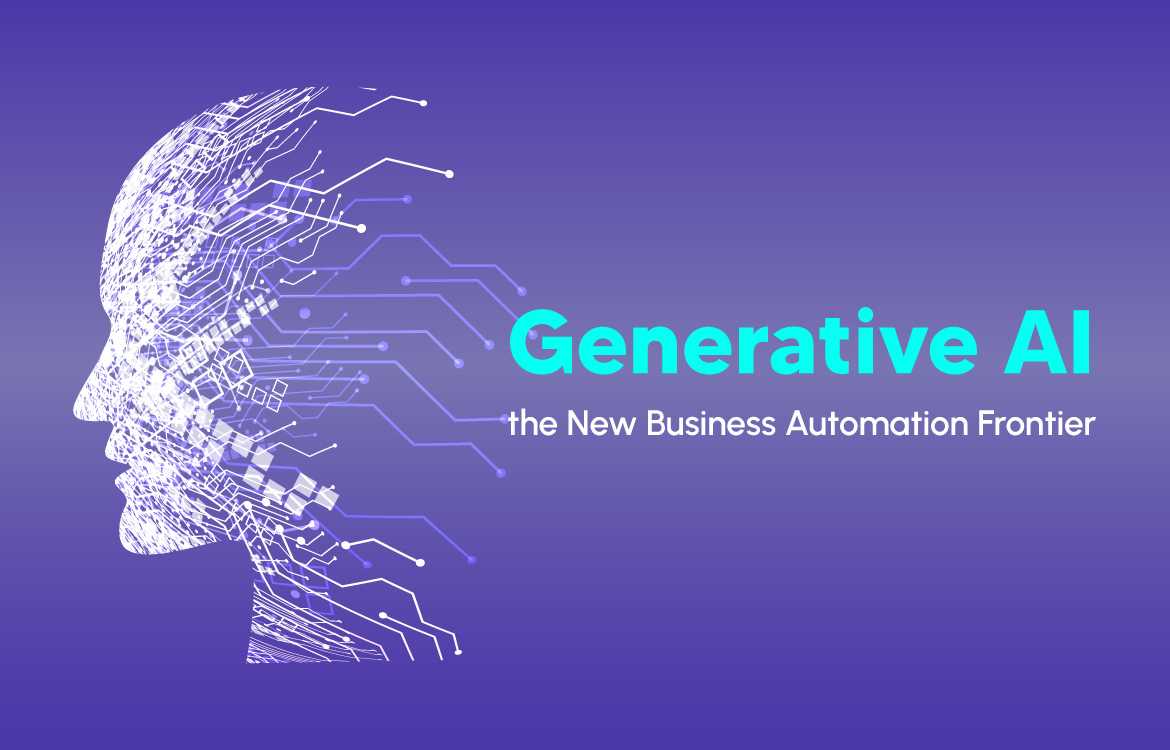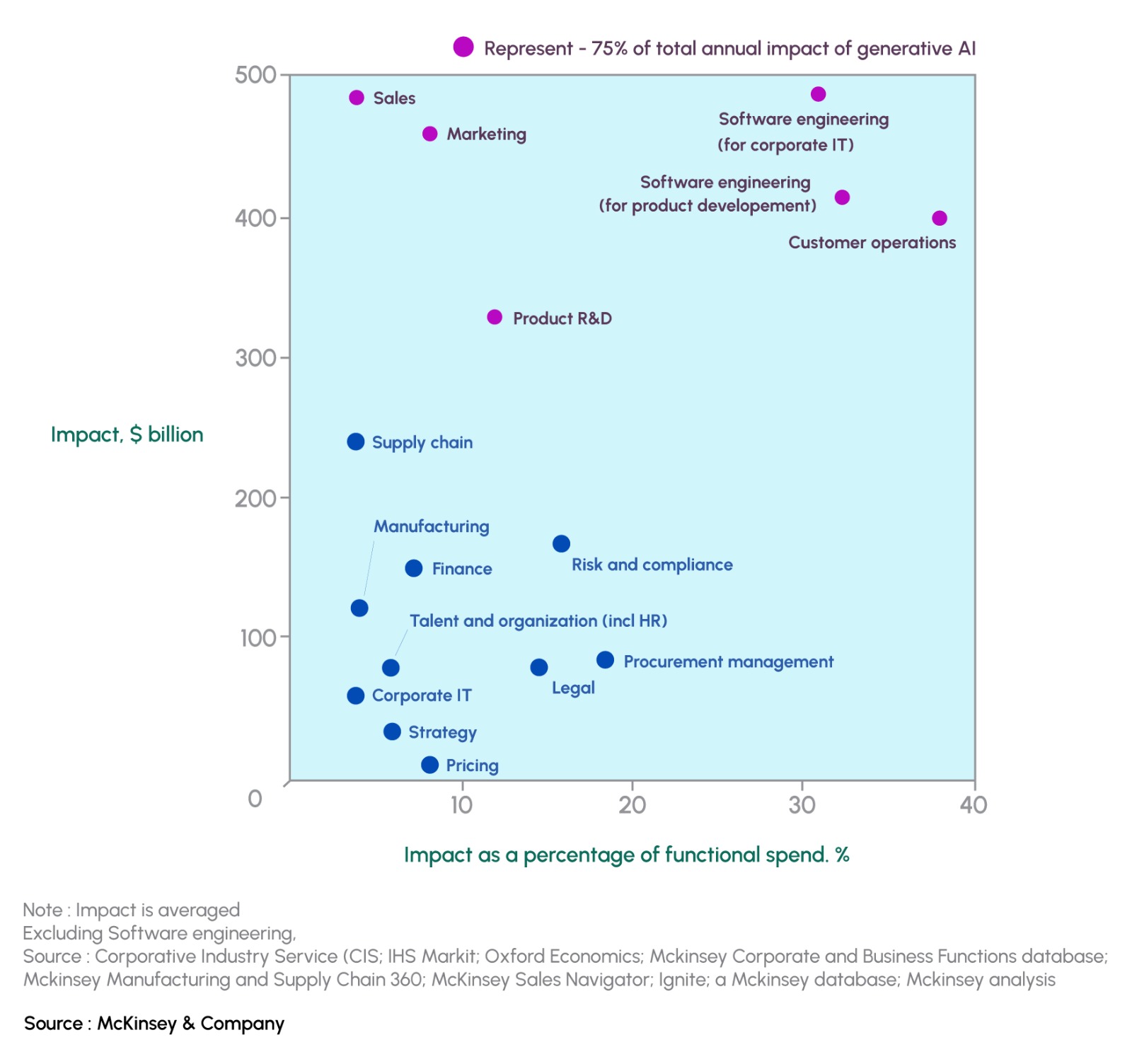
Generative AI, driven by advanced models like GPT-3 and its newer versions, is poised to revolutionize how businesses function across various industries. Before Generative AI captured our imagination with the extent of its powers, there were many skills we thought were solely human – for instance, writing code, creating content or a piece of music.
Generative AI today, stands at the cusp of unleashing a new wave of productivity. Generative AI is relatively new and we are still at the threshold of understanding its full capabilities. It is an exciting time because new applications are constantly being developed.
Generative AI will have a far-reaching impact as it continues to be increasingly integrated into business processes. This article delves into the core concepts of generative AI, explores its practical applications across industries, and real-world use cases, and provides statistics that highlight its transformative potential.
What is Generative AI?
Generative AI, often referred to as Generative Adversarial Networks (GANs), is a subset of artificial intelligence. The Generative AI technology has advanced features not just the natural interactions that we have been amazed by.
So, what is Generative AI and how is it different from AI as we know it?
- The generative AI technology excels at creating new data instances that closely resemble existing data. In contrast, traditional AI techniques, such as rule-based systems or classical machine learning algorithms, focus on pattern recognition, classification, or prediction but do not inherently generate new content.
- GANs consist of two neural networks, the generator, and the discriminator, engaged in adversarial training. The generator tries to produce realistic data, while the discriminator attempts to distinguish between real and generated data. This competitive dynamic leads to the generation of high-quality, realistic data, a concept absent in previous AI approaches.
So, what is Generative AI applications? The technology is known for its capability to create realistic data, including images, text, music, and more. This makes Generative AI a powerful tool in various applications, such as image synthesis, text generation, and creative content production.
Why Generative AI Matters for Business
Our first introduction to Generative AI was a fluid chat interface where we could type in our information in our normal everyday language and we would get answers typed back excitedly, like a brainy friend.
For both business leaders and employees, the central interface will continue to be a conversational AI assistant. This AI assistant will function much like a human knowledge worker but with the added advantage of instantaneous, real-time access to the information and resources necessary to execute its tasks. This access is facilitated by the dataset that continuously fuels the generative AI tool.
Approximately 75% of the value of generative AI use cases is expected to be distributed among four key domains: Customer operations, marketing and sales, software engineering, and research and development (R&D).
5 Key Generative AI Use Cases Transforming Industries
The advanced AI technology is all set to transform operations across industries. Generative AI companies or rather AI development companies, like iTech are now looking at integrating this advancement into more of their AI projects.
1. Healthcare And Generative AI Applications
Generative AI in healthcare will leverage advanced deep learning techniques such as GANs (Generative Adversarial Networks) to create patient-specific treatment plans. These models will analyze a patient’s medical history, genetic information, and real-time health data to generate tailored recommendations. Additionally, natural language processing (NLP) models like Transformer architecture will be used for automated medical report generation.
Benefits:
This technology provides highly personalized healthcare interventions, improved diagnosis accuracy, and better patient outcomes. It can also assist in drug discovery by simulating the effects of potential medications.
2. Increased Personalization with Generative AI in Retail
Continuous Model Training: In the retail industry, generative AI will utilize advanced machine learning algorithms combined with reinforcement learning techniques. These models will continuously analyze consumer behavior, incorporating data from IoT devices and sensors to make real-time adjustments in inventory management, pricing strategies, and personalized product recommendations.
This technology has the potential to boost productivity in the retail and consumer packaged goods (CPG) industry, resulting in a significant increase of 1.2 to 2.0 percent in annual revenues.
This kind of generative AI applications can offer customers more detailed and personalized information about products, prices, their search history, and special deals, all without needing a large customer support team. Generative AI Chatbots can provide quicker and more helpful answers to questions and searches, acting as advanced virtual shopping assistants. This can free up the back-end staff to handle more customers, concentrate on more important tasks, or get involved in other aspects of the company’s online retail operations.
3. Finance – AI consultancy services
Advanced technology in generative AI for finance will involve sophisticated algorithms for risk assessment, fraud detection, and compliance.
The banking sector, characterized by its reliance on knowledge and technology, has already experienced substantial advantages from existing AI applications, particularly in marketing and customer operations. The integration of generative AI applications holds the promise of further enhancements, particularly given the prevalence of text-based data in areas like regulatory compliance and programming languages. Additionally, this industry is customer-centric, serving a vast number of B2C and small-business customers, making it even more ready for generative AI’s potential benefits.
4. Marketing and Advertising is ripe for Generative AI Applications
Generative AI technology will integrate with big data analytics platforms, utilizing technologies like reinforcement learning for optimizing advertising campaigns. Natural language generation (NLG) models will be employed for automated content creation.
Benefits:
Marketers will achieve highly targeted advertising, better ROI, and streamlined content creation processes. AI-driven ad campaigns will adapt to changing consumer behavior and market dynamics in real time.
5. Logistics Industry: Generative AI will impact operations
Generative AI introduces a distinct approach compared to traditional AI techniques. While both generative AI and conventional AI share some similarities, generative AI leverages advanced models, particularly Generative Adversarial Networks (GANs) and Variational Autoencoders (VAEs), to generate new data or content that is similar to the existing data it has been trained on. This capability opens up unique opportunities in the logistics sector.
For instance, Generative AI can create synthetic data that closely resembles real-world logistics data, including shipment records, weather conditions, and traffic patterns. This synthetic data can be used to augment existing datasets, enhancing the training and performance of AI models. In contrast, traditional AI relies solely on existing data for analysis.
Generative AI is known for its ability to generate novel solutions and content. In logistics, this means it can creatively optimize routes, suggest innovative inventory management strategies, or generate alternative maintenance schedules. Traditional AI, while proficient, may not possess this creative problem-solving capacity.
Generative AI can power chatbots and virtual assistants capable of engaging in more natural, human-like conversations. This is particularly relevant in customer service interactions, where generative AI can provide nuanced responses and adapt to customer inquiries dynamically.
New applications will integrate the following capabilities
Enhanced Content Creation:
Generative AI can automate content creation for businesses. It can draft mails, make presentations, create product descriptions, and marketing materials, significantly reducing the time and resources required.
According to Gartner, by 2025, 50% of data science tasks will be automated through AI and machine learning, including content generation and data analysis.
Personalization:
Through the analysis of vast datasets, generative AI enables businesses to offer highly personalized recommendations and marketing messages, resulting in increased customer satisfaction and higher conversion rates.
Efficient Customer Support:
Generative AI chatbots equipped with advanced capabilities can provide round-the-clock customer support, handling routine inquiries and issues effectively, reducing customer service costs.
IBM’s Watson-powered chatbots handle over 40,000 customer inquiries daily, resulting in a 70% reduction in customer service costs and a 25% increase in customer satisfaction.
Innovative Product Design:
In sectors like fashion and automotive, generative AI assists in designing prototypes, optimizing designs, and exploring creative possibilities, leading to more innovative and efficient product development.
Data-Driven Decision-Making:
Generative AI’s data analysis capabilities allow businesses to extract valuable insights from large datasets, aiding in market research, trend analysis, and informed decision-making.

Finally…
While generative AI holds immense potential, it’s crucial for businesses to approach its adoption with a keen understanding of both its advantages and limitations. Before embarking on the journey of integrating this emerging AI technology into their operations, companies should be proactive in identifying and mitigating potential risks.
One noteworthy concern is the need for transparent and ethical AI guidelines within the enterprise setting. In the absence of such guidelines, there’s a risk that AI algorithms may inadvertently propagate misinformation or biases, potentially undermining the very business value they aim to enhance. This concern is especially pertinent for organizations operating within regulated industries such as healthcare, pharmaceutical manufacturing, banking, and insurance, where data accuracy and ethical considerations are paramount.
Is your organization looking to harness the transformative powers of Generative AI into your operations? It’s time to engage with a proven generative AI company – iTech‘s team of experts who are experienced in implementing cutting-edge AI solutions. We can help you unlock the full potential of Generative AI and tailor it to your specific business needs

Biju Narayanan
Biju is an emphatic people management leader and works by the vision that change is the door to new opportunities and innovation. As Director, he has been guiding iTech on a path of innovation for over 19 years. iTech is a full-service custom software company with a large portfolio of successful domestic and international projects including Fortune 500 organizations. Biju specializes in the healthcare, sports and logistics industries with particular focus on AI and ML. Outside of work, you may find him hitting a lethal jump smash on the badminton court and he is also a creative artist.







